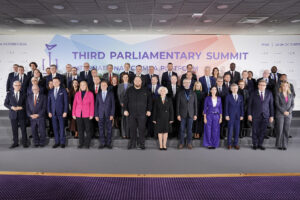Participants of the International Crimea Platform Parliamentary Summit in Riga Call for Increased Support for Ukraine in Joint Statement

On Thursday, 24 October, participants of the Third Parliamentary Summit of the International Crimea Platform adopted a joint statement, committing to continued and enhanced support for Ukraine at the parliamentary level. This includes providing the necessary political, financial, military, and diplomatic assistance to restore Ukraine’s sovereignty and territorial integrity within its internationally recognised borders, including Crimea. The summit in Riga brought together parliamentarians from approximately 50 countries worldwide in support of Ukraine.
The statement reaffirms Ukraine’s inherent right to self-defence and the liberation of its territories, which have been temporarily occupied by Russia during its unprovoked, unjustified, and illegal full-scale military aggression against Ukraine.
The parliamentarians paid tribute to the courage of people living in Ukraine’s territories under occupation, who continue to demonstrate unwavering resistance to the aggressor despite intimidation and threats from the occupying forces. The statement further notes that Russia’s ongoing armed aggression against Ukraine has resulted in numerous violations of international law, including breaches of human rights and international humanitarian law, as well as norms and principles of international order.
The parliamentarians stressed that the withdrawal of all Russian forces from Ukrainian territory and the de-occupation and return of the temporarily occupied territories, including the Autonomous Republic of Crimea and Sevastopol, to Ukrainian control are essential preconditions for ending Russia’s war of aggression against Ukraine and achieving a just and lasting peace in the region.
Participants in the parliamentary dimension of the Crimea Platform condemned, in the strongest possible terms, Russia’s illegal, unprovoked, and unjustified war of aggression against Ukraine, including Russian missile and drone attacks targeting Ukrainian civilians, civilian infrastructure, and cities across Ukraine.
The summit participants also condemned the so-called referendums, the holding of elections, and the establishment of parliamentary structures in the temporarily occupied territories of Ukraine. Furthermore, they denounced human rights violations, the forced displacement and deportation of Ukrainian civilians—including children—to Russian territory, as well as the persecution and discrimination of Ukrainians and the indigenous Crimean Tatar population. The militarisation of the Crimean Peninsula by Russia, which threatens the security and stability of the Black Sea and the Sea of Azov, hinders freedom of navigation, and adversely impacts global food security, was also strongly condemned.
Within the remit of national parliaments, the summit participants pledged to support and implement the Peace Formula put forward by Ukrainian President Volodymyr Zelenskyy, describing it as the only effective peace-building plan to restore Ukraine’s territorial integrity and ensure a comprehensive, just, and lasting peace in Ukraine and the region.
The statement also commits parliamentarians to providing full support for international investigations into war crimes, human rights abuses, and crimes against humanity committed by Russian occupying forces in the temporarily occupied territories of Ukraine, including the Autonomous Republic of Crimea and Sevastopol. “Russia must pay for the damage and devastation it has caused. “We are determined to ensure full accountability and to assist Ukraine in obtaining compensation for the loss, injury and damage resulting from Russia’s aggression and support all concerted international efforts to this effect, notably the Register of Damage for Ukraine,” the summit participants declared.
Furthermore, the states committed to supporting the introduction and further strengthening of sanctions against Russia. They also pledged to facilitate, as far as possible, the release of political prisoners and other civilians detained in the context of Russia’s aggression against Ukraine. The participants called on international monitoring bodies to continue their efforts in closely monitoring the human rights situation in Ukraine’s territories currently under temporary occupation, including Crimea.
Saeima Press Service


